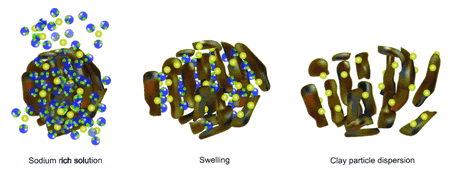


SOLUTION GRADE
Ag-Pro Brochure
Ag-Pro Spec Sheet
Ag-Pro SDS
Ag-Pro O.M.R.I. Certificate
AG GRADE
Ag Grade Specs
Ag Grade SDS
Ag Grade O.M.R.I.
SPREADABLE
Broadcast SDS
Broadcast O.M.R.I.
MORE INFO
Ag Products
Solution Grade
Sports Field Marking
Injection Equipment
Why Use Gypsum?
Low-solute water lacks the necessary level of total salts to maintain good soil structure. (e.g., A common problem with River Water or Runoff Water.) Irrigating with low-solute water will often lead to a significant disruption of soil stability commonly called “deflocculation.” When this occurs, water penetration is greatly reduced, resulting in ponding and runoff conditions which waste water and stifle root growth.
Where sodium ions dominate the irrigation water, sodic soil conditions will eventually develop. Excessive sodium works to replace calcium ions in the soil, also resulting in a breakdown of soil stability. Sodium ions have only a single positive charge and are less attracted to the soil colloid surface than calcium. This results in a “looser” soil aggregate which, together with osmotic pressure, allows water to be drawn in and cause the clay aggregates to “swell” up. Eventually the aggregates come completely apart, destroying the soil structure and dispersing individual particles or “platelets” which migrate with the water. The tiny clay particles then plug pore channels, severely restricting the ability for water and oxygen to move down through the soil profile, similar to the problem of too little salt.
Illustration of the effect of Sodium on Soil Stability and Structure:

Tight soils created by either high levels of sodium (or magnesium), or irrigation water that is too low in beneficial salts, deter optimum growing conditions by preventing water, oxygen and nutrients from moving down through the soil profile. Instead of enlarging the root zone, irrigating with poor soil structure stifles growth and tends to keep toxic sodium and bicarbonates nearer the surface, right in the root zone.
Calcium, on the other hand, will attract clay particles due to its ++ charge, creating irregular shaped molecules that have an aggregating effect. This opens up soil pores to allow water and oxygen to more easily penetrate deep into the ground. Calcium is also the element that binds organic matter to clay particles, further improving soil penetration and structure.
Gypusm will also help minimize the negative effects of carbonates/bicarbonates in irrigation water or in the soil. Through a cation exchange, gypsum (Calcium Sulfate Dihydrate) converts sodium bicarbonate to calcium carbonate, creating an inert substance that is not water soluable and is no longer toxic to plants.
Poor soil chemistry will also lead to insufficient levels of elemental calcium available for uptake, which will deprive plants of a critical micronutrient required for healthy development and growth. Regularly treating with gypsum can greatly improve turf quality and resilience, and has been proven to increase crop yields and fruit quality in many instances.